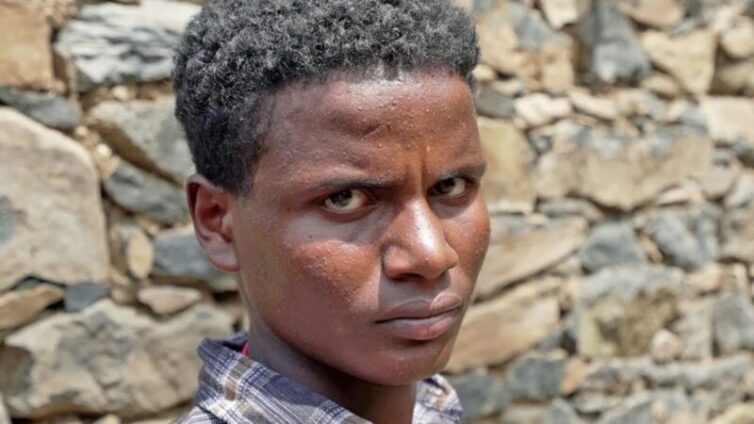Berhane Haile was walking home from school earlier this year through the mountainous countryside of Tigray in northern Ethiopia when an almighty blast changed his life forever.
The 16-year-old had just stepped on a piece of ordnance that left the bones and flesh on his left leg smashed, torn and bleeding - he was in agony.
"The explosion threw me away backwards. There was blood everywhere. People heard the sound and came rushing," he told the BBC World Service.
The teenager then had to endure being carried by his distraught father and other villagers on foot for two hours over hilly terrain to Adwa, which is the main town in the area about 162km (100 miles) north on the road from Tigray’s capital, Mekelle – and not far from the Eritrean border.
This was the location of the nearest hospital - and the medics there managed to save his life, but what was left of his leg had to be amputated. Parts of both his hands were also blown away.
His farming village of Seyabo deep in the mountains of Tigray was littered with unexploded munitions in the wake of a civil war that ended in November 2022.
These were mainly grenades, shells and other weapons left behind by fleeing fighters from both sides - no landmines are thought to have been planted in this area.
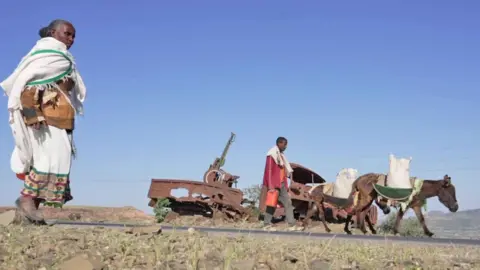
The two-year conflict, which saw millions of people fleeing their homes and becoming dependent on aid, has been described as one of Africa’s deadliest in recent decades.
It broke out in late 2020 between allied Ethiopian and Eritrean troops on one side and local Tigrayan fighters on the other, both fighting for control of the region.
An estimate by the African Union puts the number of people killed in the clashes and the humanitarian crisis prompted by the conflict as high as half a million.
Yet two years on from the peace deal that ended the war, there are still people being killed and wounded by the remnants of warfare.
Berhane had veered off the usual mountain footpath because he had spotted his family’s sheep and goats grazing - and had gone over to stop them from entering someone else’s plot of land. This is when he stood on the explosive.
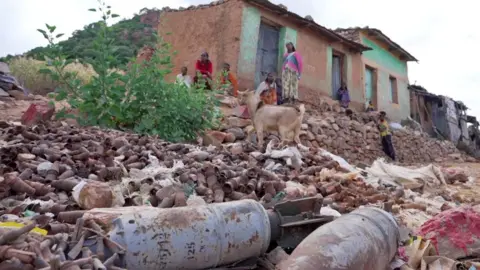
Since 2023, the Red Cross says it has helped close to 400 victims of inadvertent explosions - 80% of them children.
But the charity believes this figure is just the "tip of the iceberg".
Nigsti Gidey was five months pregnant when her husband was killed by an explosion earlier this year in Newi district, near Adwa.
He had gone out to help with construction work in their village when he stepped on some discarded ordnance. He was taken to a hospital but he did not survive.
"Ordnances are everywhere," his widow told the BBC.
"Officials tell us not to touch any metallic substance on the road."
Efforts have been made to collect unexploded weapons - like in Gorero, a small village off the side of the main road to Adwa, where officials have combed farms and fields.
But it is difficult to do extensive searches and local police chief Hadush Gebremedhin says he has asked his superiors for more support to conduct bigger sweeps.
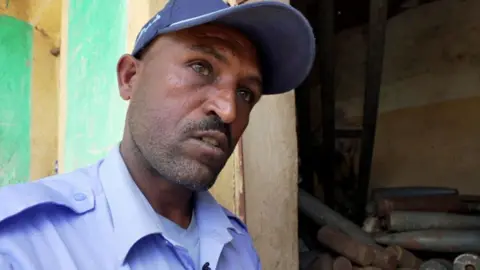
He has not heard back, meaning it is likely that resources are limited and bomb disposal experts are in short supply.
Mr Hadush’s officers have removed the fuses from some of the weapons they have found, but even so, he says extreme heat or accidental fire could detonate them.
Weapons-clearing charities - with experience dealing with the aftermath of other African conflicts - might eventually step in, but it is an issue which requires massive coordination.
In Adwa, officials who lack options to safely dispose of explosives carry them back at great personal risk to store them haphazardly in the compound of the town’s peace and security office.
Still, the all-consuming fear that reigned over Berhane’s village, where the sound of heavy gunfire once echoed through the mountains, has gone.
Basic services like electricity and the internet, cut off during the war, have resumed allowing Seyabo and other villages, towns and cities to come back to life.
Berhane was able to go back to school for the first time in years a few months after the conflict ended, but even before his accident last February, life for his family was far from normal.
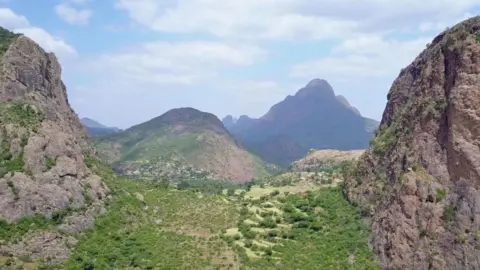
He lost his eldest brother, who was a fighter on the Tigrayan side, during the war.
One of his sisters, also a fighter, sustained permanent injuries and is still receiving medical support in Mekelle.
Another sister who had lived in a different part of Tigray was forced out of her home and has been unable to return, as her town is located in a disputed area claimed by both Tigray and the neighbouring region of Amhara.
She had been living in a camp for displaced people in Adwa town until recently when she moved to help Berhane.
As for Berhane, a humanitarian organisation has been able to provide him with a prosthetic leg and crutch, which has helped him walk again.
He was not able to move back to Seyabo, as life there often involves taking strenuous hikes through the mountains.
A usual 20-minute journey by foot to the village school would now take around an hour - so he has moved to Adwa, where he has rented a house with his sister.
They are unclear how they will cover all their costs as his sister is still dependent on aid, but Berhane says this is the best way for him to continue at school.
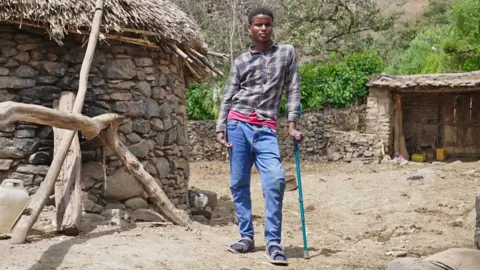
His new schoolmates helped him write notes in class as the explosion also damaged his fingers and thumbs.
"I have mixed feelings," he told the BBC about his situation.
"Sometimes I get angry but other times I realise I am still alive and feel grateful."
His dreams of one day becoming a farmer are over. Before his accident, he often helped his father on the family farm where they grew maize, sorghum and other grains.
His move to the town has upset his parents, already suffering from the repercussions of the war.
But Berhane, now 17, says he is determined to persevere so that one day he can help them.
He wants to continue his education further and has set his sights on becoming a civil servant.
Latest Stories
-
University of Ghana slams Auditor-General’s report, denies GH¢59.2 million payroll overstatement
19 minutes -
Inside Mahama’s “Big Push” agenda: The $10 billion blueprint Ghana’s future depends on
1 hour -
Moody’s downgrades US credit rating citing rising debt
2 hours -
GAF commanders pledge entire month’s salary to Mahama Cares Fund
3 hours -
GoldBod’s magic trick: Turning $279m into $897m – Where did the extra come from?
3 hours -
IERPP cautions GoldBod: Ghana gold export math discrepancy explained
3 hours -
AMA to begin decongestion exercise on May 20, orders all persons affected to vacate areas by close of May 19
4 hours -
Makola Market traders educated on insuring goods against fire
4 hours -
Absa: Ghana cedi rallied too far
4 hours -
DW Global Media Forum offers journalists platform to break barriers, build bridges
4 hours -
Volta Regional Minister fulfils GH₵10k pledge to GJA Volta, inspires others to give back
5 hours -
OPIT ready to train a generation of African AI champions
5 hours -
UG debunks claim of overstating employee compensation by GH¢59m
5 hours -
Seven-member committee submits report on the death of Nigerian boxer Gabriel Oluwasegun
5 hours -
‘I gave 500 cedis, not dollars’ – Mahama jests amid Sammy Gyamfi dollars gift
6 hours

